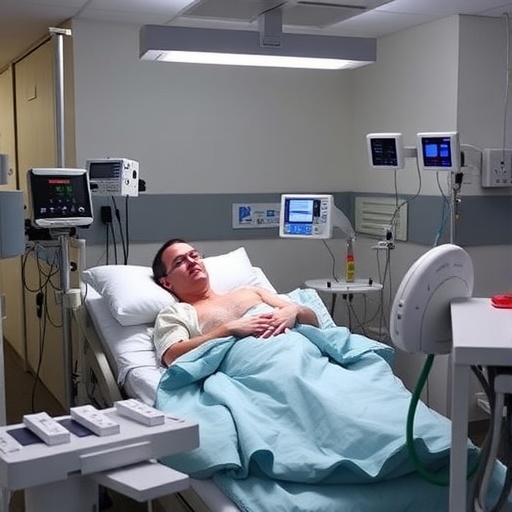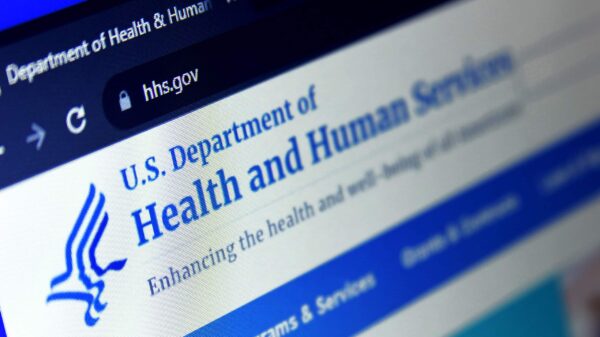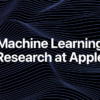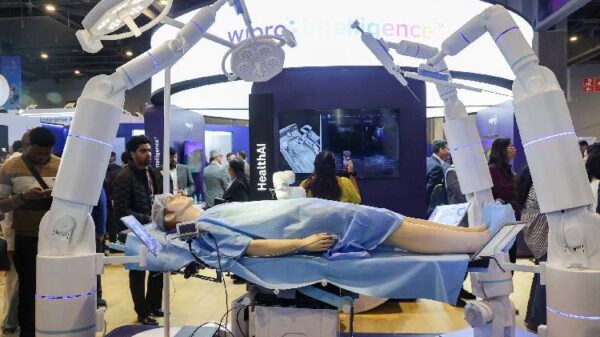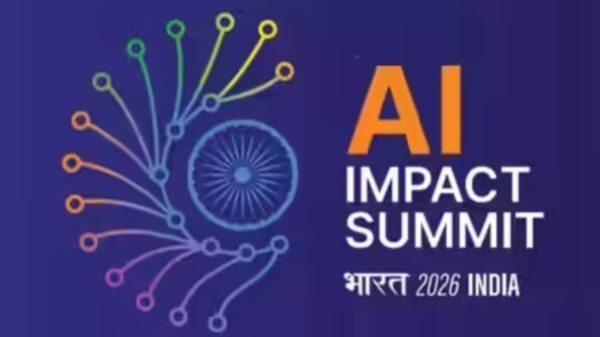In the rapidly evolving landscape of artificial intelligence (AI) and machine learning (ML) in healthcare, a recent study by Liu et al. published in BMC Endocrine Disorders provides a significant breakthrough in diabetes management. Researchers have developed and rigorously validated a novel hypoglycemia risk prediction model aimed at hospitalized patients with type 2 diabetes, a demographic particularly susceptible to sudden drops in blood sugar levels. This advancement could redefine clinical approaches to diabetes care.
Hypoglycemia, characterized by dangerously low blood sugar levels, is a prevalent and serious complication for individuals with diabetes, especially those on insulin therapy. In hospital settings, hypoglycemic episodes can not only compromise immediate patient health—leading to symptoms such as confusion, seizures, and loss of consciousness—but also prolong hospital stays and inflate healthcare costs. Given these risks, the need for effective preventive strategies has never been more urgent. Traditional monitoring techniques often rely on reactive measures, which may fail to preemptively identify patients at risk.
Technology Behind the Development
The innovative approach undertaken in this study underscores the efficacy of machine learning algorithms in predicting adverse medical events like hypoglycemia. Machine learning, a subset of AI, enables the analysis of vast datasets to unearth patterns and make predictions that far exceed human analytical capabilities. By training an algorithm on extensive datasets that include patient demographics, medical histories, and lab results, the researchers constructed a model that accurately predicts the risk of hypoglycemic episodes among hospitalized patients with type 2 diabetes.
One of the study’s key features is its comprehensive validation process. The researchers employed a robust methodology that assessed the model’s predictive performance using standard statistical metrics such as sensitivity, specificity, and the area under the curve (AUC). More importantly, the model was designed for real-world applicability, bridging the gap between theoretical performance and practical healthcare delivery. With this predictive model, healthcare professionals can identify high-risk patients preemptively, enabling timely interventions like medication adjustments or enhanced monitoring.
Why It Matters
This research offers more than just a theoretical framework; it presents a compelling case for integration into clinical practice. The model’s user-friendly interface allows physicians and healthcare staff to access risk assessments in real-time, streamlining decision-making processes in high-pressure environments like hospitals. The findings suggest that employing this predictive model could lead to tailored care protocols that enhance patient safety and optimize healthcare resource usage.
Alongside the model’s development, the researchers conducted a thorough review of existing literature on diabetes management and hypoglycemia risks. By situating their findings within broader healthcare paradigms, they highlight how machine learning could transform not only diabetes management but also other chronic health conditions. This sets a precedent for future research across various medical domains, demonstrating that similar methodologies can be replicated and adapted.
The implications of this research extend beyond immediate healthcare improvements. By curbing incidents of hospital-acquired hypoglycemia, patient trust and satisfaction are likely to rise. When patients feel assured that their conditions are actively monitored, they are more inclined to have positive healthcare experiences. This could lead to better adherence to treatment regimens, improved health outcomes, and a reduction in long-term complications.
As global healthcare systems face challenges related to resource allocation and efficiency, predictive models like the one developed by Liu et al. can serve as essential tools. By preventing complications, hospitals can mitigate the strain on services, leading to optimized care delivery and reduced costs. This is particularly relevant in the context of an aging population with increasingly complex health issues, underscoring the need for efficient, predictive healthcare solutions.
However, challenges remain in the widespread implementation of such models across healthcare systems. Issues such as staff training, patient data privacy, and the integration of AI solutions into existing healthcare infrastructures must be addressed. Collaboration among healthcare administrators, policymakers, and IT professionals is crucial to ensure the benefits of predictive analytics are realized while safeguarding patient safety and privacy.
In summary, the study by Liu et al. signifies a meaningful advancement in predicting and preventing hypoglycemic events in hospitalized patients with type 2 diabetes. Through the innovative application of machine learning and a patient-centered approach, this research paves the way for enhanced safety and improved clinical outcomes. As healthcare continues to evolve, technological advancements like this will be vital in addressing current challenges and shaping the future of chronic disease management.
The ongoing discourse in the medical community around this groundbreaking research inspires hope—and raises expectations—for integrating cutting-edge technologies in healthcare. The transformative potential for diabetes treatment could be profound, shifting the paradigm from reactive care to a more proactive and targeted approach. While the journey for implementing and refining machine learning models is just beginning, their potential to redefine healthcare delivery is unmistakable.
Subject of Research: Hypoglycemia risk prediction model for hospitalized type 2 diabetes patients using machine learning.
Article Title: Construction and validation of a hypoglycemia risk prediction model for hospitalized type 2 diabetes patients based on machine learning.
Article References: Liu, C., Huang, Z., Liu, T. et al. Construction and validation of a hypoglycemia risk prediction model for hospitalized type 2 diabetes patients based on machine learning. BMC Endocr Disord (2025). https://doi.org/10.1186/s12902-025-02104-x
Image Credits: AI Generated
DOI: 10.1186/s12902-025-02104-x
Keywords: hypoglycemia, diabetes, machine learning, predictive model, healthcare innovation, patient safety.
Tags: artificial intelligence in diabetes care, complications of insulin therapy, healthcare cost reduction strategies, hospitalized patients and hypoglycemia, improving patient outcomes in diabetes, machine learning in healthcare, novel predictive algorithms in medicine, predicting hypoglycemia in diabetics, proactive diabetes monitoring strategies, risk prediction models for hypoglycemia, type 2 diabetes management.
See also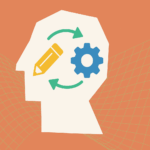 Anthropic Launches Claude Use Case Library for Practical Generative AI Tasks
Anthropic Launches Claude Use Case Library for Practical Generative AI Tasks Nokia Invests $4 Billion in U.S. to Propel AI-Driven Network Technologies and Innovation
Nokia Invests $4 Billion in U.S. to Propel AI-Driven Network Technologies and Innovation OpenAI Launches Nano Banana Pro with 2K and 4K Resolution for Enhanced Ad Creation
OpenAI Launches Nano Banana Pro with 2K and 4K Resolution for Enhanced Ad Creation Alphabet Stock Surges 2.1% to $290.25 on Major AI Advancements, Boosting Investor Confidence
Alphabet Stock Surges 2.1% to $290.25 on Major AI Advancements, Boosting Investor Confidence Perplexity Launches AI-Powered Comet Browser for Android with Voice Interaction and Summarization Features
Perplexity Launches AI-Powered Comet Browser for Android with Voice Interaction and Summarization Features















































